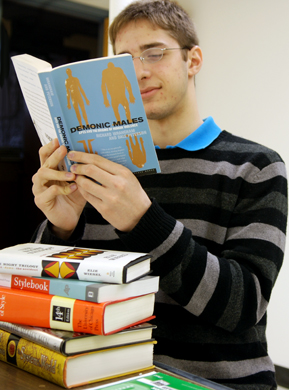Major Confusion
One student’s long, strange journey to choose a major

This world is full of choices, and here are the big three on campus:
Where are you gonna live?
What are you gonna major in?
What kind of job are you gonna get?
BU Today is onto all three this week, beginning yesterday with housing, segueing to a first-person account of “major confusion” today, and wrapping up tomorrow with a look at the help available to find a job — even in this economy.
I don’t understand how people come into college knowing exactly what they want to do for the rest of their lives — when I first came to BU, I didn’t even know how many career options existed. I chose English as my major based on the process of elimination: I didn’t love math or science and I liked my high school English classes. But since then, I’ve contemplated careers in journalism, anthropology, and medicine, changed my major three times, and considered giving it all up to become a rock star. (As in, I took a guitar class.)
A friend from high school once told me that my indecisiveness would be my undoing, and I can definitely see his point. But I think I’ve used my indecisiveness to my advantage: I finally found something I’m really excited about studying, and in the process, I’ve opened myself up to a lot of new ideas.
First semester freshman year, I took courses in poetry, English literature, Italian (to make my mom happy — she’s from a small town near Rome), and astronomy. Next semester, I needed a nonlab science credit, so I signed up for Introduction to Biological Anthropology, not even knowing what anthropology was. Again, my family was involved: my older brother always encourages me to take classes that could open me up to different experiences. The course focused on human evolution, human paleontology, and nonhuman primates, as well as the evolutionary aspects of human behavior — pretty cool, right? Major number two: anthropology.
But I was meeting new people and making friends, too, and a lot of them were communications majors. Being a journalist sounded exciting, so I got an internship at BU Today and started thinking about switching to the College of Communication. Major number three — or maybe career choice number three, if anyone’s counting.
 Then I entered sophomore year undeclared, and the deadline loomed. Astronomy? No. Journalism? Maybe. English? So 2006. Psychology? Where did that come from? Anthropology? All signs point to yes. Pre-med? Well, throw it into the mix. My friends, family, and professors became my exceedingly patient sounding boards. Half the time I felt like I should do it all; half the time I wanted to ditch all of my classes and just play my guitar for five hours a day.
Then I entered sophomore year undeclared, and the deadline loomed. Astronomy? No. Journalism? Maybe. English? So 2006. Psychology? Where did that come from? Anthropology? All signs point to yes. Pre-med? Well, throw it into the mix. My friends, family, and professors became my exceedingly patient sounding boards. Half the time I felt like I should do it all; half the time I wanted to ditch all of my classes and just play my guitar for five hours a day.
To add to my confusion, I enrolled in an international relations course and ended up enjoying the material so much that I added it to my list of possible majors. Now I had five options, and time was running out.
So what made me choose biological anthropology — the course I took on a whim? I like the idea of learning more about human behavior and different cultures. Plus, it could lead to even more new experiences, like traveling around the world and working with endangered primates. But I don’t regret spending so much time experimenting in my first two years of college: I learned about academic fields that I never knew existed and met tremendous professors, as well as fascinating classmates. Thanks to them, I’m confident that I made the right choice.
It takes a lot of confidence to come to college knowing what you want to do, but I think it’s just as valuable to admit that you don’t have a clue. Do I know what career lies ahead of me? No. But at least I know a little bit more about myself and where my interests lie.
Davide Nardi met Bono recently and is contemplating becoming a rock star again. He can be reached at dnardi@bu.edu.
Have a major switch story to tell? Let us know in the comments below.
Comments & Discussion
Boston University moderates comments to facilitate an informed, substantive, civil conversation. Abusive, profane, self-promotional, misleading, incoherent or off-topic comments will be rejected. Moderators are staffed during regular business hours (EST) and can only accept comments written in English. Statistics or facts must include a citation or a link to the citation.